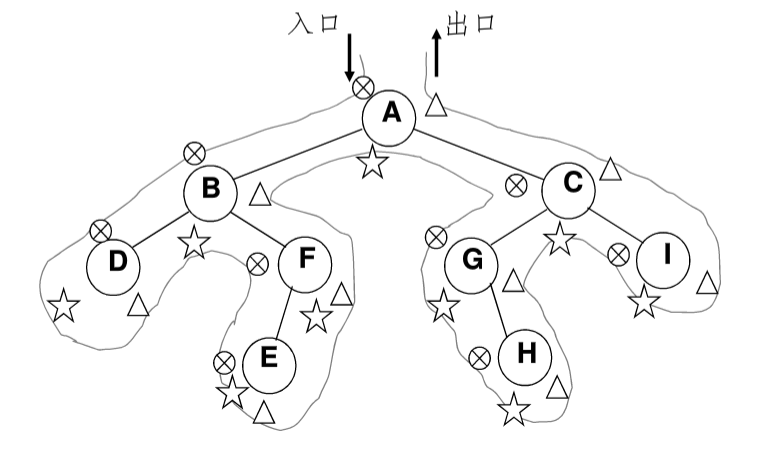关于树的非递归遍历
结论:
用栈模拟实现中序遍历,Push操作的数据过程是先序遍历,Pop操作的数据过程是中序遍历
解析:

如图,常见的树的遍历方式(包括前序、中序、后序),实际上是将整棵树以这样的路线跑了1遍,只是碰到的时机不同。
综合来看每个结点都碰到了3次,分别标注了不同的符号,其中⊗是先序遍历,☆是中序遍历,△是后序遍历。
现在我们考虑非递归方式实现中序遍历:使用堆栈。
算法:
遇到一个结点,就把它压栈,并去遍历它的左子树。
当左子树遍历结束后,从栈顶弹出这个结点。
然后按其右指针再去中序遍历该结点的右子树。
代码:
void InorderTraversal (BinTree BT){
BinTree T = BT;
stack<int> st;
while(T||!st.empty()){//树不空且堆栈不空
while(T){
st.push(T);//此处相当于图中第一次碰到结点
T=T->left;//一直往左走
}
if(!st.empty()){
printf("%d",st.top());//访问操作
st.pop();//此处相当于图中第二次碰到结点
T=T->right;//转向右子树
}
}
}
如果要用非递归的方式实现前序遍历呢?
只需要把访问操作的代码提前,改到第一次碰到结点的位置即可。
如果要用非递归的方式实现后序遍历呢?
在不修改结点结构的情况下,可以采取二次入栈,相当于图中第三次碰到结点时进行访问操作。
那么非递归层序遍历怎么办?
建议使用队列模拟。
本题参考解法: 前序遍历+中序遍历假建树的方式进行后序遍历
#include<iostream>
#include<cstring>
#include<algorithm>
#include<stack>
#include<vector>
#include<sstream>
using namespace std;
int n;
vector<int> preorder,inorder,postorder;
stack<int> st;
void build(int inL, int inR, int preL,int preR){//假建树
if(inL>inR) return ;
int root=preorder[preL];
int k;
for(k=inL;k<=inR;k++){
if(inorder[k]==root){
int numLeft=k-inL;
build(inL,k-1,preL+1,preL+numLeft);
build(k+1,inR,preL+numLeft+1,preR);
postorder.push_back(root);
}
}
}
int main(){
scanf("%d\n",&n);
for(int i=0;i<n*2;i++){
string str;
getline(cin,str);
stringstream ssin(str);//字符串流
string a,b;
ssin>>a>>b;
if(a=="Push"){//说明是Push,Push顺序就是前序遍历
preorder.push_back(stoi(b));
st.push(stoi(b));
}else{//pop出来模拟的是中序遍历
inorder.push_back(st.top());
st.pop();
}
}
build(0,n-1,0,n-1);
for(int i=0;i<n;i++){
if(i==0) printf("%d",postorder[i]);
else printf(" %d",postorder[i]);
}
return 0;
}
看起来更简洁的版本
#include<iostream>
#include<cstring>
#include<vector>
#include<stack>
using namespace std;
const int N=40;
int n;
vector<int> pre,in,post;
stack<int> st;
void build(int inL,int inR,int preL,int preR){
if(inL>inR) return ;
int root=pre[preL];
int k;
for(k=inL;k<=inR;k++)
if(in[k]==root)
break;
if(k>inL) build(inL,k-1,preL+1,preL+k-inL);
if(k<inR) build(k+1,inR,preL+k-inL+1,preR);
post.push_back(root);
}
int main(){
cin>>n;
for(int i=0;i<n*2;i++){
string str;
cin>>str;
int x;
if(str=="Push"){
cin>>x;
pre.push_back(x);
st.push(x);
}else{
x=st.top();
in.push_back(x);
st.pop();
}
}
build(0,n-1,0,n-1);
cout<<post[0];
for(int i=1;i<n;i++)
cout<<" "<<post[i];
return 0;
}


tql